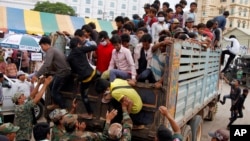[Editor’s Note: Despite an increase in remittances from migrant workers, a new report on labor migration in Southeast Asia produced by the International Labor Organization and International Migration Organization, calls for a shift in policy making to more migrant-centered approaches. VOA Khmer’s Nov Povleakhena and Khan Sokummono spoke with Ben Harkins, the report’s co-author and a technical officer with the ILO’s Asia-Pacific office, about what Cambodia can do to improve the situation for overseas workers.]
VOA: First of all, can you tell us about the significance of your report regarding Cambodian migrant workers?
Ben Harkins: One key thing we did find is that Cambodians are particularly vulnerable to abuses abroad. We found about 80 percent reported that they suffered labor rights violations in destination countries, and that certainly does have a negative impact on the long-term benefits that they receive from migration. We did look at the practices and conditions that might improve the benefits for Cambodian migrants, and really what we found was that it’s labor rights protection in destination countries that are most consistently important in facilitating a positive outcome for them. And to facilitate that, yes, we really need to improve protection of the rights of Cambodian migrants, both in destination countries and also during their recruitment in Cambodia, so that we ensure that they have a safe and rewarding migration experience.
VOA: The report calls for a shift in the focus of migration policies in Asean, to a more migrant-centered approach. Can you elaborate on the Cambodia context?
Ben Harkins: What we’ve found is often the way governments look at migration and its impact on development is very much focused on how large the scale of remittances are that are sent back home. And what we’ve tried to do is say, ‘Look, it’s actually a much more complex change that takes place for migrants.’ It's not only that they have these short-term increases in their incomes that are sent back in remittances, but also they really develop a lot of skills abroad that they can use when they return back home if things go well. Also [there are] broader changes to their livelihood when they return. They may move into higher skilled jobs which afford better wages and working conditions. So you can’t really just simplify a migration experience into the number of remittances that were sent home. You need to look more holistically at how migration affected the lives of migrant workers and their family members.
VOA: What lessons can Cambodians learn to improve the conditions for migrant workers?
Ben Harkins: I think there is a need for much more intentional labor migration policies on the Thailand side to make sure that migrants are able to come and enjoy decent work opportunities for employers in Thailand, that Thai employers get their labor needs filled by Cambodian migrants that are qualified for those jobs. You really need a long-term policy on migration to Thailand. These ad hoc approaches are sometimes causing difficulties and need to be reconsidered.
VOA: Both jobs in Thailand and Malaysia offered to migrant workers are low-skill jobs. How can we prepare access to skill development for those workers?
Ben Harkins: I think it’s a key point. What the report calls for is really expanding skills training for migrants that match with employer requirements, but also skills training that doesn't create an additional burden on the time and resources of migrant workers. So we know most migrants from Cambodia are currently recruited based upon the need for low-wage workers rather than their skills match with the job opening, and we do think that a closer matching of migrant workers' skills with employment opportunities would really benefit both employers and migrants, because it would contribute to increased productivity, but also better wages and working conditions for migrants. I think one option that we've seen from this report that’s an effective modality that doesn't add to the cost and time for migrant workers is on-the-job training programs and paid apprenticeships. What we are recommending is that partnerships be built between employers and technical and vocational, education and training institutions that can promote skills training system that is really more inclusive for both women and men migrant workers, and also responsive to labor market needs in destination countries.
VOA: What are the impacts of the flow of migrant workers in Asean? Do you think there is a threat to countries like Cambodia where so many workers travel abroad?
Ben Harkins: What we see primarily from Cambodia is migrants going abroad for low-skilled jobs, and I think what we’re trying to get across with this report is that there are actually real potential benefits to Cambodia to having migrants go abroad and obtain new skills that they can bring back into the Cambodian labor market, [as well as] of course all the increased financial resources which can help them to establish businesses, which can help them to support their families, which can help them to pay for medical costs, education costs for their family. I think we see that actually there are a lot of benefits from migration for Cambodia, and we just think that there are steps that could be taken to increase positive benefits, and reduce some of the negative outcomes that do occur Cambodian migrants. What we found in our report in particular was yes, we need to try to avoid migrants going into debt when they go abroad, we need to be sure that they receive labor rights protections in destination countries, we need to be sure that they do have opportunities to increase their skill levels, and finally, when they do return to Cambodia, that there are viable employment opportunities so that they aren't forced to migrate again just to obtain a job.







